人教版七年级英语下册第二单元知识点总结
人教版七年级英语下册第二单元知识点总结
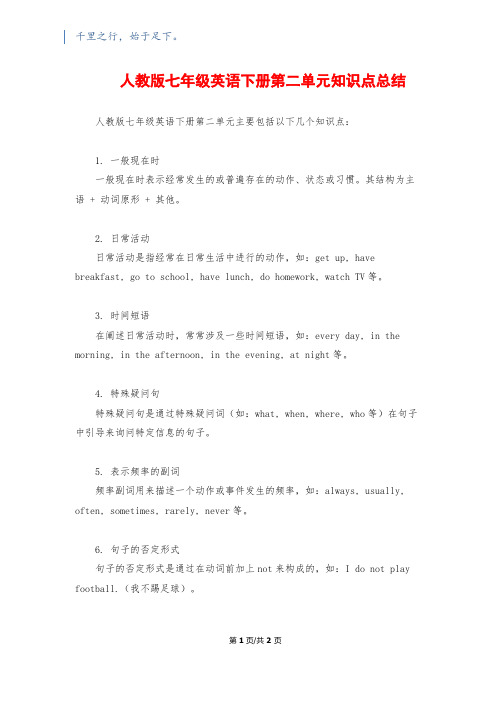
千里之行,始于足下。
人教版七年级英语下册第二单元知识点总结人教版七年级英语下册第二单元主要包括以下几个知识点:1. 一般现在时一般现在时表示经常发生的或普遍存在的动作、状态或习惯。
其结构为主语 + 动词原形 + 其他。
2. 日常活动日常活动是指经常在日常生活中进行的动作,如:get up, have breakfast, go to school, have lunch, do homework, watch TV等。
3. 时间短语在阐述日常活动时,常常涉及一些时间短语,如:every day, in the morning, in the afternoon, in the evening, at night等。
4. 特殊疑问句特殊疑问句是通过特殊疑问词(如:what, when, where, who等)在句子中引导来询问特定信息的句子。
5. 表示频率的副词频率副词用来描述一个动作或事件发生的频率,如:always, usually, often, sometimes, rarely, never等。
6. 句子的否定形式句子的否定形式是通过在动词前加上not来构成的,如:I do not play football.(我不踢足球)。
第1页/共2页锲而不舍,金石可镂。
7. 照片描写照片描写是通过描述照片中的人物、场景和动作来展示对照片的理解,如:There are three girls in the photo.(照片里有三个女孩)。
8. 人物介绍人物介绍是用来介绍他人的个人信息和特点的句子,如:This is my friend, Lily. She is tall and has long hair.(这是我的朋友莉莉。
她个子高,头发长)。
9. 情感表达情感表达是用来表达个人情感或态度的句子,如:I like playing basketball.(我喜欢打篮球)。
10. 文化背景在学习英语过程中,还可以了解一些与英语相关的文化背景知识,如:英语国家的民俗风情、历史文化等。
人教版七年级英语下册Unit 2知识点汇总
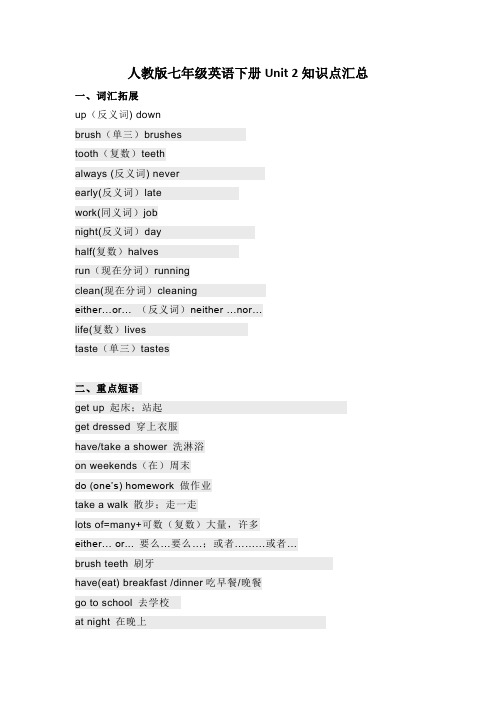
人教版七年级英语下册Unit 2知识点汇总一、词汇拓展up(反义词) downbrush(单三)brushestooth(复数)teethalways (反义词) neverearly(反义词)latework(同义词)jobnight(反义词)dayhalf(复数)halvesrun(现在分词)runningclean(现在分词)cleaningeither…or… (反义词)neither …nor…life(复数)livestaste(单三)tastes二、重点短语get up 起床;站起get dressed 穿上衣服have/take a shower 洗淋浴on weekends(在)周末do (one’s) homework 做作业take a walk 散步;走一走lots of=many+可数(复数)大量,许多either… or... 要么…要么…;或者………或者…brush teeth 刷牙have(eat) breakfast /dinner吃早餐/晚餐go to school 去学校at night 在晚上from…to… 从……到……in the morning/ afternoon /evening 在上午/下午/晚上go to work 去上班That's a funny time for… 那是做……有意思的时间。
be late for………迟到on school days 在上学期间a quarter past /to+钟点数……过/差一刻钟go to bed 上床睡觉half past +钟点数……点半go home回家eat quickly 吃得快play sports 做运动have much time for …有许多时间做……for half an hour 半小时get home 到家eat a good breakfast 早餐吃得好,好好吃一顿早餐eat … for lunch午餐吃……after lunch /dinner 午餐/晚餐后be (not) good for 对……健康有(没)益taste good 尝起来好吃have a very healthy life 有健康的生活need to do … 需要做……from Monday to Friday从周一到周五radio station 广播电台make breakfast for sb. 替某人做早饭get to school 到校三、经典句型1.---What time do you usually get up,Rick?里克,你通常几点起床?---I usually get up at six thirty.我通常六点半起床2.---When does Scott go to work?斯科特什么时候去上班?---He always goes to work at eleven o'clock.他总是在十一点去上班。
人教版七年级英语下册第二单元知识点总结
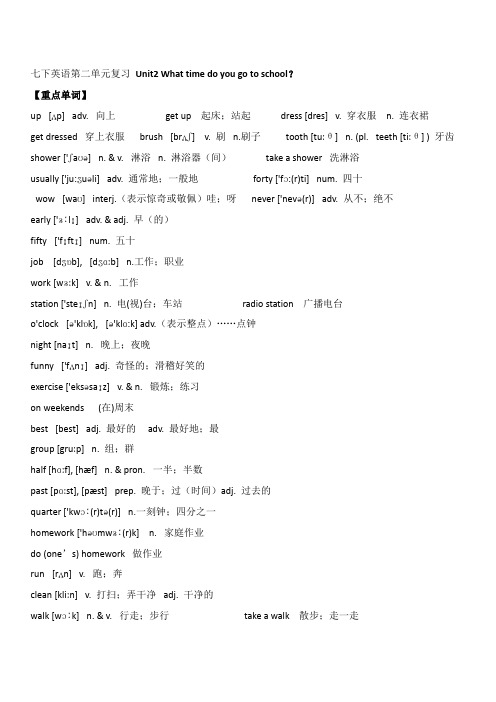
七下英语第二单元复习Unit2 What time do you go to school?【重点单词】up [ʌp] adv. 向上get up 起床;站起dress [dres] v. 穿衣服n. 连衣裙get dressed 穿上衣服brush [brʌʃ] v. 刷n.刷子tooth [tuːθ] n. (pl. teeth [tiːθ] ) 牙齿shower['ʃaʊə] n. & v. 淋浴n. 淋浴器(间)take a shower 洗淋浴usually ['ju:ʒuəli] adv. 通常地;一般地forty ['fɔ:(r)ti] num. 四十wow [waʊ] interj.(表示惊奇或敬佩)哇;呀never ['nevə(r)] adv. 从不;绝不early ['ɜːlɪ] adv. & adj. 早(的)fifty ['fɪftɪ] num. 五十job [dʒɒb], [dʒɑːb] n.工作;职业work [wɜːk] v. & n. 工作station ['steɪʃn] n. 电(视)台;车站radio station 广播电台o'clock [ə'klɒk], [ə'klɑ:k] adv.(表示整点)……点钟night [naɪt] n. 晚上;夜晚funny ['fʌnɪ] adj. 奇怪的;滑稽好笑的exercise ['eksəsaɪz] v. & n. 锻炼;练习on weekends (在)周末best [best] adj. 最好的adv. 最好地;最group [gruːp] n. 组;群half [hɑːf], [hæf] n. & pron. 一半;半数past [pɑːst], [pæst] prep. 晚于;过(时间)adj. 过去的quarter ['kwɔː(r)tə(r)] n.一刻钟;四分之一homework ['həʊmwɜː(r)k] n. 家庭作业do (one’s) homework 做作业run [rʌn] v. 跑;奔clean [kliːn] v. 打扫;弄干净adj. 干净的walk [wɔːk] n. & v. 行走;步行take a walk 散步;走一走quickly ['kwɪkli] adv. 很快地either ['aɪðə(r)], ['iː ðə(r) ]adv. 或者;也(用在否定词组后)either…or …要么……要么……;或者……或者……lot [lɒt], [lɑ:t] pron. 大量;许多lots of 大量;许多sometimes ['sʌmtaɪmz] adv. 有时taste [teɪst] v. 有……的味道;品尝n.味道;滋味life [laɪf] n. 生活;生命【重点短语】1. go to school 去上学2. get up 起床26. go to bed 睡觉30. get home 到达家3. get dressed 穿衣服4. brush teeth 刷牙5. eat breakfast 吃早饭6. take a shower 洗澡7. what time 什么时间8. at six forty 在六点四十18. at about ten twenty 在大约十点二十9. an interesting job 一个有趣的工作10. at the radio station 在广播电视台11. usually /always/ often/ sometimes/ never经常/总是/经常/有时/从不12. your radio show 你的广播节目13. from …..to 从….到…..14. at night 在夜晚15. a funny time 一个有趣的时间16. take exercise 锻炼17. be late for….. 因…迟到19. on weekends 在周末20. on school days 在上学日21. half past six 六点半29. half an hour 半个小时22. a quarter past three 三点过一刻(3:15)23. a quarter to ten 十点差一刻(9:45)24. do (one’s)homework做(某人的)家庭作业25. take a walk 散步27. eat quickly 吃得快32. eat a good breakfast 好好吃顿早餐38. have dinner 吃晚饭28. have much time 有许多时间31. either…..or 或者…….或者......33. lots of = a lot of 许多34. be good for….. 对…….有益35. taste good 尝起来好36. do her homework 做她的家庭作业37. have a healthy life 有一个健康的生活方式【重点句型】1. What time do you go to school?你几点去上学?2. 一What time do you usually take a shower,Kick?瑞克,你通常几点钟淋浴?—I usually take a shower at six forty.我通常六点四十淋浴。
人教版七年级初一英语下册Unit2短语、语法知识点汇总

人教版七年级初一英语下册Unit2短语、语法知识点汇总一、基础归纳重点短语1.去上学go to school2.起床get up3.穿衣服get dressed4.刷牙brush teeth5.吃早饭eat breakfast6.洗澡take a shower7.什么时间what time8.在六点四十at six forty9.一份有趣的工作an interesting job10.在广播电台at the radio station11.从…到from…..to12.在夜晚at night13.做运动、锻炼take exercise/play sports14.迟到…be late for15.在周末on weekends16.在上学日on school days17.六点半(逆读)half past six18.三点十五(逆读)a quarter past three19.九点四十五(逆读)a quarter to ten20.散步take a walk21.去睡觉go to bed22.吃得快eat quickly23.半个小时half an hour24.或者…或者…either…..or25.许多(+可/不可)lots of=a lot of26.对…有益be good for….27.尝起来好taste good28.有健康的生活方式have a healthy life重点句型1.你几点去上学?What time do you go to school?2.瑞克,你通常几点钟淋浴?What time do you usually take a shower,Rick?3.我通常六点四十淋浴。
I usually take a shower at six forty.4.你什么时候去上班?When do you go to work?5.十一点,我上班从来没有迟到过At eleven o’clock,so I’mnever late for work.6.他们几点钟穿上衣服?What time do they get dressed?7.他们总是七点二十穿上衣服。
人教版七年级英语下册第二单元知识点汇总
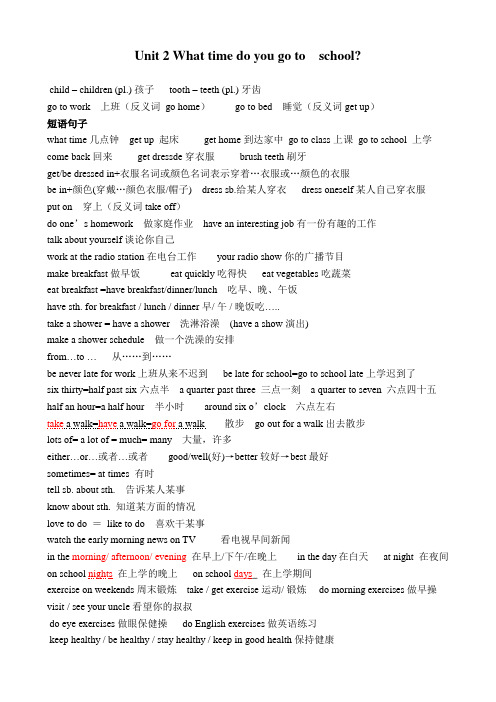
Unit 2 What time do you go to school?child – children (pl.) 孩子tooth – teeth (pl.) 牙齿go to work 上班(反义词go home)go to bed 睡觉(反义词get up)短语句子what time 几点钟get up 起床get home到达家中go to class上课go to school 上学come back 回来get dressde穿衣服brush teeth刷牙get/be dressed in+衣服名词或颜色名词表示穿着…衣服或…颜色的衣服be in+颜色(穿戴…颜色衣服/帽子) dress sb.给某人穿衣dress oneself某人自己穿衣服put on 穿上(反义词take off)do one’s homework 做家庭作业have an interesting job 有一份有趣的工作talk about yourself谈论你自己work at the radio station 在电台工作your radio show 你的广播节目make breakfast做早饭eat quickly 吃得快eat vegetables 吃蔬菜eat breakfast =have breakfast/dinner/lunch 吃早、晚、午饭have sth. for breakfast / lunch / dinner 早/ 午 / 晚饭吃…..take a shower = have a shower 洗淋浴澡(have a show演出)make a shower schedule 做一个洗澡的安排from…to …从……到……be never late for work 上班从来不迟到be late for school=go to school late上学迟到了six thirty=half past six六点半 a quarter past three 三点一刻 a quarter to seven 六点四十五half an hour=a half hour 半小时around six o’clock 六点左右take a walk=have a walk=go for a walk 散步go out for a walk出去散步lots of= a lot of = much= many 大量,许多either…or…或者…或者good/well(好)→better较好→best最好sometimes= at times 有时tell sb. about sth. 告诉某人某事know about sth. 知道某方面的情况love to do =like to do 喜欢干某事watch the early morning news on TV 看电视早间新闻in the morning/ afternoon/evening在早上/下午/在晚上in the day在白天at night 在夜间on school nights在上学的晚上on school days在上学期间exercise on weekends 周末锻炼take / get exercise 运动/ 锻炼 do morning exercises 做早操visit / see your uncle 看望你的叔叔do eye exercises 做眼保健操do English exercises 做英语练习keep healthy / be healthy / stay healthy / keep in good health 保持健康What do you do ? =What are you ? =What’s your job ? 你是干什么的?get up early 起得很早 a quarter past three in the afternoon 下午3 点15分go home early 早点回家clean up the room 打扫干净房间clean the room 打扫房间clean my room 打扫我的房间play sports 做运动 do your homework first 先做作业listen to 听… listen to the early morning news on radio 听电台早间新闻don’t have much time for breakfast 没有很多时间吃早饭play basketball for half an hour 打半个小时的篮球either watch TV or play computer games 要么看电视要么玩电脑游戏eat a good breakfast 吃一顿丰盛的早餐eat lots of fruit and vegetables for lunch 午饭吃许多水果和蔬菜be good for your health 对你的健康有好处taste good味道很好have a very healthy life有一个健康的生活healthy activities 健康的活动unhealthy habits 不健康的习惯1.英语时间的表达(1)整点时间可表示为“钟点数+o’clock”或直接读钟点数,省去o’clock。
人教版七年级英语下册第二单元知识点总结
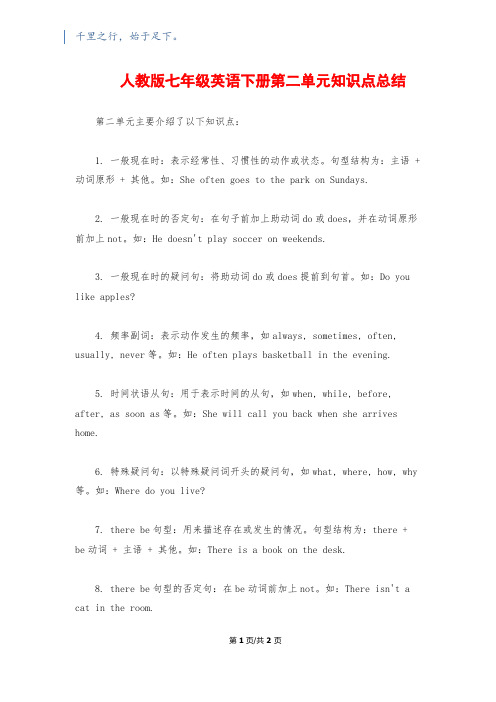
千里之行,始于足下。
人教版七年级英语下册第二单元知识点总结第二单元主要介绍了以下知识点:1. 一般现在时:表示经常性、习惯性的动作或状态。
句型结构为:主语 + 动词原形 + 其他。
如:She often goes to the park on Sundays.2. 一般现在时的否定句:在句子前加上助动词do或does,并在动词原形前加上not。
如:He doesn't play soccer on weekends.3. 一般现在时的疑问句:将助动词do或does提前到句首。
如:Do you like apples?4. 频率副词:表示动作发生的频率,如always, sometimes, often, usually, never等。
如:He often plays basketball in the evening.5. 时间状语从句:用于表示时间的从句,如when, while, before, after, as soon as等。
如:She will call you back when she arrives home.6. 特殊疑问句:以特殊疑问词开头的疑问句,如what, where, how, why 等。
如:Where do you live?7. there be句型:用来描述存在或发生的情况。
句型结构为:there + be动词 + 主语 + 其他。
如:There is a book on the desk.8. there be句型的否定句:在be动词前加上not。
如:There isn't a cat in the room.第1页/共2页锲而不舍,金石可镂。
9. there be句型的疑问句:将be动词提到句首。
如:Is there a park near your house?希望以上总结对您有所帮助!。
人教版七年级英语下册Unit2知识点归纳
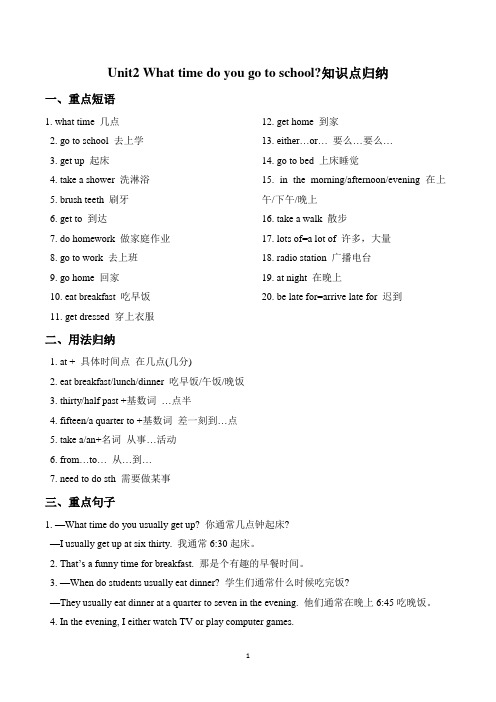
Unit2 What time do you go to school?知识点归纳一、重点短语1. what time 几点2. go to school 去上学3. get up 起床4. take a shower 洗淋浴5. brush teeth 刷牙6. get to 到达7. do homework 做家庭作业8. go to work 去上班9. go home 回家10. eat breakfast 吃早饭11. get dressed 穿上衣服12. get home 到家13. either…or… 要么…要么…14. go to bed 上床睡觉15. in the morning/afternoon/evening 在上午/下午/晚上16. take a walk 散步17. lots of=a lot of 许多,大量18. radio station 广播电台19. at night 在晚上20. be late for=arrive late for 迟到二、用法归纳1. at + 具体时间点在几点(几分)2. eat breakfast/lunch/dinner 吃早饭/午饭/晚饭3. thirty/half past +基数词…点半4. fifteen/a quarter to +基数词差一刻到…点5. take a/an+名词从事…活动6. from…to… 从…到…7. need to do sth 需要做某事三、重点句子1. —What time do you usually get up? 你通常几点钟起床?—I usually get up at six thirty. 我通常6:30起床。
2. That’s a funny time for breakfast. 那是个有趣的早餐时间。
3. —When do students usually eat dinner? 学生们通常什么时候吃完饭?—They usually eat dinner at a quarter to seven in the evening. 他们通常在晚上6:45吃晚饭。
七年级英语人教版下册Unit2重点知识点归纳
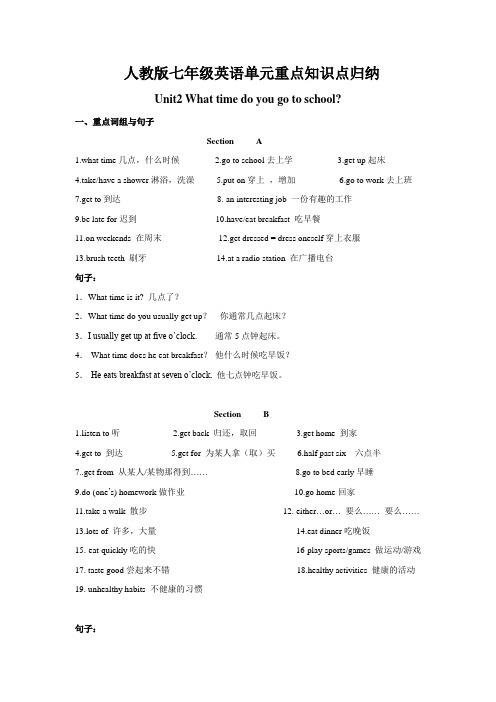
人教版七年级英语单元重点知识点归纳Unit2 What time do you go to school?一、重点词组与句子Section A1.what time几点,什么时候2.go to school去上学3.get up起床4.take/have a shower淋浴,洗澡5.put on穿上,增加6.go to work去上班7.get to到达8. an interesting job 一份有趣的工作9.be late for迟到10.have/eat breakfast 吃早餐11.on weekends 在周末12.get dressed = dress oneself穿上衣服13.brush teeth 刷牙14.at a radio station 在广播电台句子:1.What time is it? 几点了?2.What time do you usually get up?你通常几点起床?3.I usually get up at five o’clock. 通常5点钟起床。
4.-What time does he eat breakfast?他什么时候吃早饭?5.-He eats breakfast at seven o’clock. 他七点钟吃早饭。
Section B1.listen to听2.get back 归还,取回3.get home 到家4.get to 到达5.get for 为某人拿(取)买6.half past six 六点半7..get from 从某人/某物那得到……8.go to bed early早睡9.do (one’s) homework做作业10.go home回家11.take a walk 散步12. either…or…要么……要么……13.lots of 许多,大量14.eat dinner吃晚饭15. eat quickly吃的快16 play sports/games 做运动/游戏17. taste good尝起来不错18.healthy activities 健康的活动19. unhealthy habits 不健康的习惯句子:1.When do students usually eat dinner?学生们通常什么时候吃晚餐?2.I don’t have much time for breakfast.我没有许多时间吃早餐。
- 1、下载文档前请自行甄别文档内容的完整性,平台不提供额外的编辑、内容补充、找答案等附加服务。
- 2、"仅部分预览"的文档,不可在线预览部分如存在完整性等问题,可反馈申请退款(可完整预览的文档不适用该条件!)。
- 3、如文档侵犯您的权益,请联系客服反馈,我们会尽快为您处理(人工客服工作时间:9:00-18:30)。
七年级下册第二单元知识点总结
短语归纳(学生必背内容)
1.what time几点2.go to school去上学3. get up 起床 4.take ashower洗淋浴
5.brush teeth刷牙6.get to到达7.do homework做家庭作业 8.go towork去上班9.go home回家10.eat breakfast 吃早饭11.getdressed穿上衣服 12.get home 到家13.either.....or……要么....要么..... 14.go to bed 上床睡觉
15.in the morning/aftemnoon/evenin 在上午/下午/晚上
16.take a walk散步17.lots of=a lot of许多,大量18.radio station 广播电台19.at night 在晚上
20.belate for迟到 21.on weekends 在周末22.eat quickly 吃得快 23.play sports做运动ﻫ24.play computer games玩电脑游戏 25.begood for对....有好处26.bego od with sb…善于和某人打交道
用法归纳(学生必背内容)ﻫ1.at具体时间点”在几点(几分) 例句展示:I eat breakfast at 7:45a.m. every morning.
2.eat brealkast/lunch/dinner吃早饭/午饭/晚饭
3.take+a(n)+名词从事....活动take a walk=gofor a walk=have a walk散步
4.halfpast+ 基数词....半例句展示:half past nine九点半
5.a quarter to+ 点整差一刻到.... a quartertoten十点差一刻
6.from..to...从......... 例句展示:We have English class from7:10am to7:55 every evening.
7.need to do sth.需要做某事例句展示:You need to have a good re st.你需要好好休息。
8.taste + 形容词尝起来...... 例句展示:The appletastes good.
9.Here+be+名词这是....;这里有….例句展示:Here is aletter foryou.这里有你一封信。
本单元语法讲解:
what time与when区别
两者都可以对时间进行提问,表示“什么时候”。
1.what time用来询问具体的时间点;when既可以用来询问具体的时间点,还可以用来询问时间段。
具体用法如下:对时间状语提问时,有时两者可以互换。
ﻫ What time/When do you usually go to sch ool?你通常什么时候去上学?
2向对方询问具体时间时,即几点几分,只能用what time,不能用when。
What timeis it?几点了?
3询向年份、月份、日期时,只能用when,不能用what time。
When is the Music Festival?音乐节是什么时候?
英语钟点时刻的表达方式:
①采用数词表达时间
7:30 seven thirty7:15seven fifteen 7:45seven forty-five
②采用介词past,to
表达时间一般说来半个小时以内,常用介词past,表示“几点过几分”;
a quarter past seven7:15 twenty past eight 8:20
半小时过后,常用介词to,表示“差几分到几点”ﻫtwo to two两点差两分(1:58) ten tofive五点差十分(4:50)
本单元出现的频度副词
always,usally,sometimes,never.
always 是频度最大的词,意为“总是; 永远”;usually意为“通常”,即很少有例外,频度仅次于always;sometimes 意为“有时”;never 意为“从不”。
John always comes late.约翰总是迟到。
I usually go to school bybus.我通常乘公共汽车上学。
He sometimes plays volleyball after school.他有时放学后打排球。
I never drink milk.我从不喝牛奶。
频度副词一般放在实义动词之前,be 动词、助动词或情态动词之后。
ﻫWe never eatjunk food.我们从不吃垃圾食品。
Lucy is sometimes very busy.露西有时很忙。
对频度副词提问时,用how often。
ﻫ一How oftendo you exercise?你多久锻炼一次?一Ha rdly ever.几乎从不。
巩固练习题
1.- --do youusually go shopping? ---On Sundays.ﻫA.When B.Where C.Wh at D.Why
2. does Lily have lunch at school?一At twelve o'clock.
A.What
B.HOWC.What time D.How much
3.一Have you ever been to Disneyland?-No,______.I hope Ican go there next year.ﻫ A .always B.someti mes C.never D.often
4.-Ms.Lin is very popular among the students. 一Yes.Her classes are .lively and in
5.(四川乐山中考)-Do yo teresting.ﻫ A.always B.sometimes C.hardly D.neverﻫ
u ofen go fishing with your fauher?一No, .Idon't like fishing atall.ﻫ A.never B.always, C.usually。
